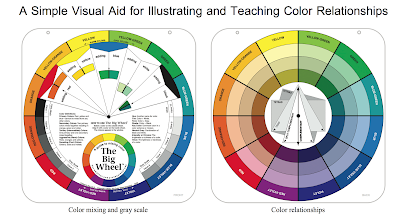Workshop Contents
The Artist's Triadic Color Wheel:
Brief discussion of the terms on the color wheel as an introduction to the workshop. We will return to the color wheel later. This workshop will use this triadic artist's color wheel methodology of primaries (as well as the Munsell Circle's) See: David Briggs: The Dimension of Color for a description of more fully developed, technically accurate systems.
Many color wheels:
Many color wheels:
From Newton to RGB
Digression: What is Color?:
 |
| Briggs' Spectrum |
For an in-depth discussion of Color: see What is color? In summary: As proposed by Young and Helmholtz in the 19th century, the trichromatic theory held that three receptors sensitive to the parts of the spectrum seen as red, green and blue or violet generated fundamental sensations, and explained the sequence of spectral colours as successive combinations of these three sensations in changing proportions. Yellow was considered to be one such "compound" sensation composed of red and green sensations. In the modern zone theory, an updated form of the trichromatic receptor model is coupled with the opponent model of colour perception. The L, M, and S cones respond most strongly to the parts of the spectrum seen as yellow, green and blue-violet respectively, and the brain creates yellow/blue and red/green opponent colour signals based indirectly on signals representing differences in the cone responses. The sequence of colours of the spectrum is explained as the product of successive combinations of these red, yellow, green and blue opponent hue signals: (again from Briggs).
=================================
Classical, Impressionist and Modern Palettes from the Gamblin website
We might be discussing or experimenting with color wheels based on the following three sets of pigment palettes:
We might be discussing or experimenting with color wheels based on the following three sets of pigment palettes:
From the Gamblin Paint Website:
Digression in some depth: Classical, Impressionistic, Modern Palettes
Description of different palette types as illustrated by Gamblin:
 |
| Classical, Impressionist, Modern Palettes |
 |
| Paintings-clasical, impressionist, modern |
Impressionist Palette: Cadmium Yellow Light, Cadmium Yellow Deep, Cadmium Orange, Cadmium Red Light, Alizarin Crimson, Cobalt Violet, Ultramarine Blue, Cerulean Blue, and Viridian.
Modern/Spectral Palette: Hansa Yellow Light, Hansa Yellow Medium, Hansa Yellow Deep, Mono Orange, Napthol Scarlet, Quinacridone Red, Quinacridone Violet, Dioxazine Purple, Phthalo Blue, Manganese Blue Hue, Phthalo Green, and Phthalo Emerald.
And videos: Navigating Color Space by Gamblin (in the workshop, TIME PERMITTING, but I recommend that you look at these videos to reinforce the understanding of hue, value and chroma).
===============================
The Artist's Color Wheel Revisited
===============================
Color Harmony:
===============================
Other artist's tools: Brief demonstrations. Additional color wheels, the Magic Palette and color picker, color charts, Munsell color chips). How can they help? Can they?
===============================
Color Mixing for Printers and Monitors. (time permitting). See the post on Web-base Apps.
===============================
Color Mixing for Printers and Monitors. (time permitting). See the post on Web-base Apps.











